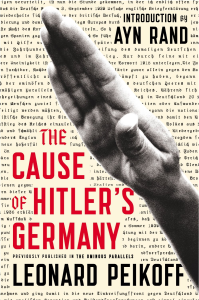FROM AYN RAND’S 1980 INTRODUCTION TO THE OMINOUS PARALLELS
 …It is not necessary for me to prove that something is wrong with today’s world. Everybody—of any creed, color, or intellectual persuasion, old and young, rich and poor, conservative and liberal, foreign and domestic—senses that something monstrous is destroying the world. But no one knows what it is, and people keep blaming one another—with some justice.
…It is not necessary for me to prove that something is wrong with today’s world. Everybody—of any creed, color, or intellectual persuasion, old and young, rich and poor, conservative and liberal, foreign and domestic—senses that something monstrous is destroying the world. But no one knows what it is, and people keep blaming one another—with some justice.
As a symptom of today’s cultural anxiety, observe the unusual interest in and the deluge of books dealing with Nazi Germany. Every sort of semi-plausible and wholly impossible theory has been offered in futile attempts to find the cause and explain the rise of Nazism. The failure of those explanations intensifies the quest: men seem to sense that the collapse of what had been a civilized country into such monstrous evil must be understood if we are to make certain that it will not be repeated. “We dare not brush aside unexplained a horror such as Nazism,” states Dr. Peikoff. If we do not know its causes, how can we be sure that our own country is not traveling the same road?
Dr. Peikoff answers these questions. He identifies the cause of Nazism….He demonstrates that there is a science which has been all but obliterated in the modern world. “Yet this science determines the destiny of nations and the course of history…,” he writes. “It is the science which had to be destroyed, if the catastrophes of our time were to become possible. The science is philosophy”
The non-modern (and non-old-fashioned) aspect of Leonard Peikoff’s book is the breadth of his vision and the stunning scale of his philosophic integration. He does not share the concrete-bound, college-induced myopia of those alleged philosophers who study the various meanings of the word “but” (the contemporary empiricists)—nor does he share the foggy stumbling and the floating abstractions of their predecessors (the rationalists). He presents the history of Germany’s philosophy, in telling essentials….Then he presents the practical results—the way in which philosophic ideas direct the course and shape the particular events of the history of [the Weimar Republic], as reflected in politics, economics, art, literature, education, etc.
This last is the cardinal achievement of Dr. Peikoff s book. While today’s philosophy departments make it a loud point to proclaim that philosophy has nothing to do with practical life or with reality (which, they add, does not exist)—Dr. Peikoff shows to their mangled victims what philosophy is, what it does, and how to recognize its influence all around us. He gives a virtuoso performance of shuttling effortlessly between abstractions and concretes—keeping the first tied firmly to reality and thus illuminating the second. He shows that a nation brought up to regard the principles of duty and self-sacrifice as cardinal virtues will be helpless when confronted by a gang of thugs who demand obedience and self-sacrifice.
It is a tragic irony of our time that the two worst, bloodiest tribes in history, the Nazis of Germany and the Communists of Soviet Russia, both of whom are motivated by brute power-lust and a crudely materialistic greed for the unearned, show respect for the power of philosophy (they call it “ideology”) and spend billions of their looted wealth on propaganda and indoctrination, realizing that man’s mind is their most dangerous enemy and it is man’s mind that they have to destroy, while the United States and the other countries of the West, who claim to believe in the superiority of the human spirit over matter, neglect philosophy, despise ideas, starve the best minds of the young, offer nothing but the stalest slogans of a materialistic altruism in the form of global giveaways, and wonder why they are losing the world to the thugs.
As an example of why the cause of Nazism should be understood (but is not), I would like to mention a recent television interview with Helmut Schmidt, Chancellor of West Germany. Asked to name his favorite philosopher, he answered —in a changed tone of voice, a stiff, solemn, deaf-and-blind, heel-clicking tone—”Marcus Aurelius. He taught that we must do our duty above all.” If he is typical of his country (and I believe he is), Germany has learned nothing.
The ineffable monster destroying the world is not an entity but a vacuum, an absence, the emptiness left by the collapse of philosophy. In that lightless emptiness, mindless men rattle frantically, bumping into one another, seeking desperately some way to exist on earth—which they cannot find without the tool they have discarded. This leads to phenomena such as Nazi Germany or Soviet Russia, as Dr. Peikoff demonstrates.
[…]
Ayn Rand
New York, November 1980